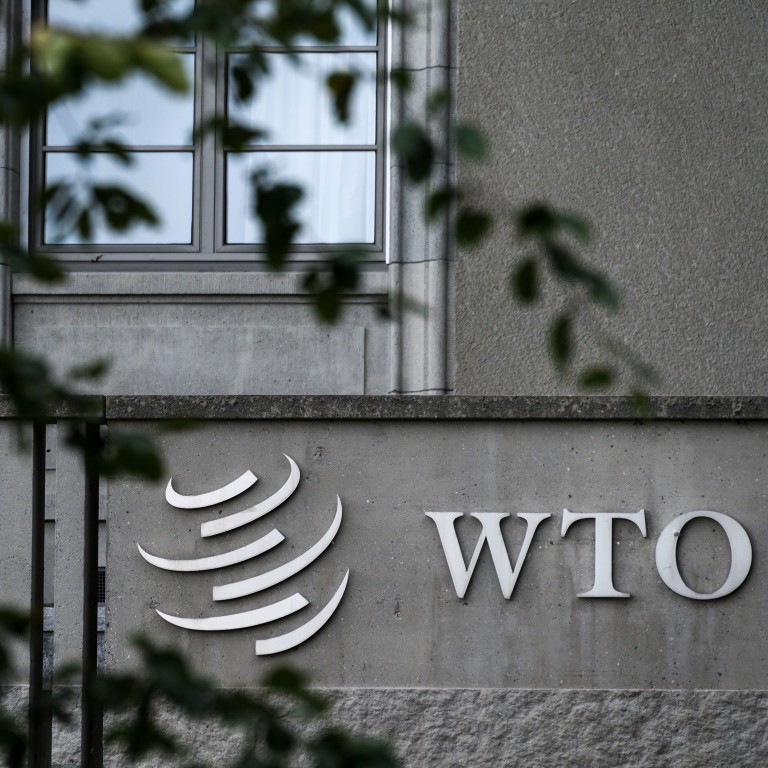
China’s WTO win over US offers no concrete reward but Beijing gets moral high ground, experts say
- Chinese officials ‘certainly happy’ with World Trade Organisation ruling that some of Donald Trump’s trade war tariffs are illegal
- However, a frosty political climate and dysfunction at the Geneva body suggest the spoils of victory will be moral rather than concrete
The Chinese government may feel vindicated by a World Trade Organisation (WTO) ruling that some of US President Donald Trump’s trade war tariffs flouted international rules, but in reality gains little from the verdict other than the moral high ground, according to pundits in China.
A panel of three trade experts made the ruling after Trump unilaterally imposed tariffs on more than US$350 billion worth of Chinese imports – a move he said was in response to Beijing’s unfair trade practices. This marks the first ruling from a number of dispute cases filed by China at the Geneva body in response to US trade war tariffs, which were first launched in July 2018.
Beijing is expected to use the dispute-settlement body’s ruling – that US tariffs on US$234 billion of Chinese goods were illegal – for propaganda purposes at home, while trying not to kick the hornets’ nest abroad, with Trump already lambasting the WTO’s findings.
“China feels vindicated, but it will get very little from this. The tariffs won’t go away or be reduced as a result of this, so the impact is very limited,” said John Gong, a professor of economics at the University of International Business and Economics (UIBE) in Beijing. “For the US, the outcome would have been anticipated, so this result will not have any effect on the US’ future actions.”
Kong Qingjiang, a WTO expert at the China University of Political Science and Law, said that Chinese officials he had been in touch with were “certainly happy”, but “aware that the victory will not give rise to any concrete legal results – this is the dilemma China must face”.
Trade watchers had expected the verdict, as the protracted trade war is generally accepted to have been conducted outside the rules of the global trading system, both in the case of the US and with regard to China’s retaliation.
“The trade community always knew US measures were inconsistent with WTO disciplines, and the panel report confirms that – there was really no legal basis,” said Tatiana Prazeres, a former senior adviser at the WTO, and ex-Brazilian foreign trade secretary, who is now a senior fellow at the UIBE.
The US had lodged a defence stating that the tariffs were “measures necessary to protect US public morals”, rather than contesting that they were not deviating from WTO rules. The defence was not upheld by the panel, which found insufficient evidence supporting the claims.
China’s Ministry of Commerce welcomed the verdict, stating that it hoped the US “will fully respect the ruling of the expert panel and the rules-based multilateral trading system, and take practical actions to meet China and other WTO members in jointly maintaining the multilateral trading system”.
For his part, Trump on Tuesday reiterated his stance that he is “not a big fan of the WTO, that I can tell you right now”.
“We’ll have to do something about the WTO, because they’ve let China get away with murder,” Trump added. “We’ll take a look at that.”
“China cannot take retaliatory measures that would further deteriorate bilateral relations,” said Qingyi Su, a senior research fellow at the Institute of World Economics and Politics. “The dispute between the US and China can only be settled bilaterally in the end.”
Siqi Li, a professor at the China Institute of WTO Studies, added that China viewed the panel ruling as a “parallel solution to the bilateral talks” with the US in ending the trade war.
“The WTO panel ruling could provide a legal basis, while bilateral US-China talks can address certain political and economic concerns,” she said. “Since the WTO’s Appellate Body is in paralysis, the final result of this US-China tariff war will be more dependent on how the phase one trade deal goes.”
In the meantime, all eyes in Beijing will remain fixed on whether the Trump administration decides to pull the plug on the WTO – a threat that the president has repeatedly made.
“Not just China, but every single member at the WTO is worried that Trump will withdraw from the WTO,” said Sun Lei, a partner at Beijing law firm Dacheng who has represented the Chinese government in previous WTO cases. “In that regard, this could be a disaster for the WTO. But I think the panel came to the right result.”


